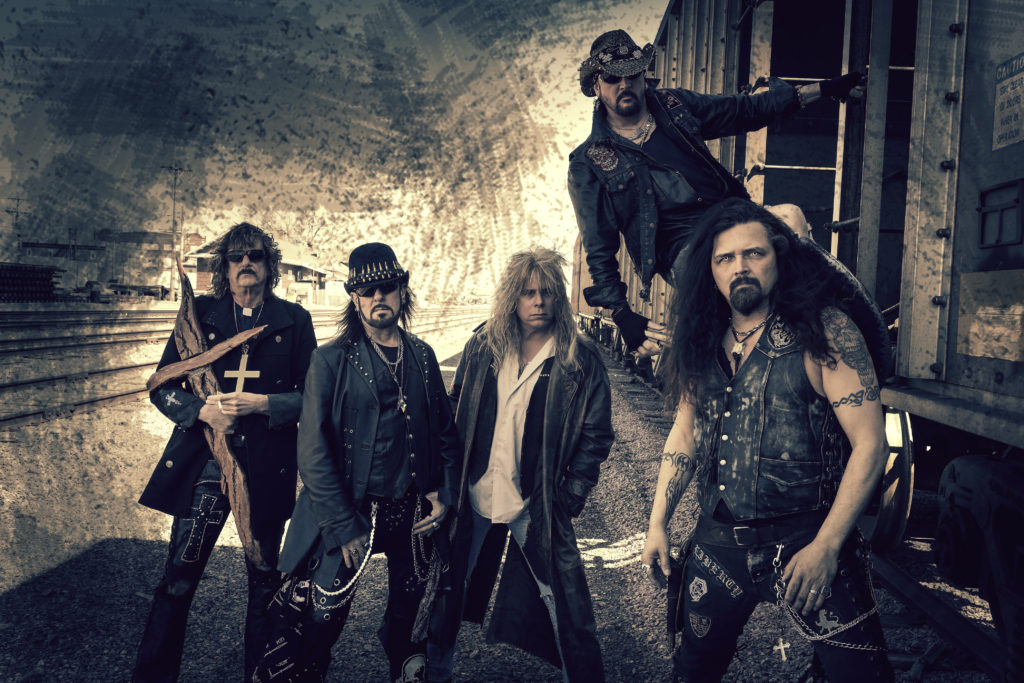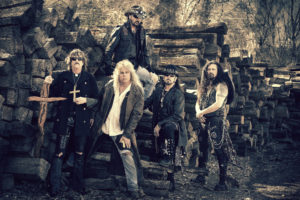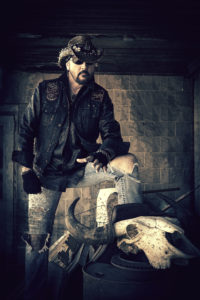
Veteran American rocker Ron Keel believes his band’s new album, Fight Like A Band, is the best thing he has done in his nearly four-decade long career at the centre of the rock and roll game.
Best known for his eponymously-named 1980s metal band Keel, as well as for discovering Swedish guitar master Yngwie Malmsteen in his early band Steeler, is a survivor in an often harsh industry. He has released more than a dozen studio albums under the Keel, Steeler, Fair Game, Iron Horse and Ron Keel Band monikers and endured more than his fair share of ups and downs, both personally and professionally.
But he has persevered and even thrived. Even in the face of possible personal tragedy, he hunkered down, remained positive and relied on the strength of his closest friends and collaborators as well as the soothing, empowering jolt of rock music to keep him going.

All of which has led to Fight Like A Band, which was released earlier this spring on EMP Label Group (founded by Megadeth’s Dave Ellefson], and is already garnering scintillating reviews from both the music press, industry tastemakers and the music-buying public. Part of the reason for this acclaim is the unmistakable sense of emotional intensity and urgency that underlies every song, every vocal line, every musical performance on each track.
It is an authentic, anthemic shout out to the power of inner strength, the reliance on a trusted band of brothers and the ultimate power of rock and roll to get not just Keel himself, but anyone, through the hard times.
The power of positivity infuses everything Keel does, and musically the notion of self-empowerment has been a core principle and thematic element in many of his songs, including the 1985 hit The Right to Rock, from the album of the same name. That fist pumping, foot stomping call to arms for the youth still carries great weight today. The material Keel has penned since then continues in the same vein, but especially on Fight Like A Band, has become more of a message of self-reliance and steadfastness under duress than angsty rebelliousness.
“I appreciate the feedback now more than ever. And it’s not just my job to come on the interview with you and say this is the best thing I’ve ever done. I believe it; this is my pinnacle, my ultimate achievement. I do actually feel that way about this record. I love this album, man, and listen to it every day. I’ve got it in my truck in the CD player, I’ve got it on my phone, on my laptop. I am still listening to this record and enjoying it,” said Keel from his home just outside Sioux Falls, South Dakota, where he lives in a spacious cabin-like home with the view of lakes, rivers, forests and mountains out his back deck.
“The fact that the media and the fans feel the same way is amazing. There are long-time fans who don’t think I have done anything good since the third Keel album, The Final Frontier in 1986, saying that they love this album. So now these people are putting this album on that same pedestal means so much to me. It really does. You get into this business as a kid to be liked. Yeah, you want to play, you want to express yourself, but the first time I ever went behind a drum kit or picked up a guitar was the first time people looked at me and respected me and liked me. I was a geek. I was an outsider when I was a kid and music gave me an avenue to make friends and pick up chicks. And that’s got to be the prime motivation for anybody in the entertainment business. Why would you get into it if you don’t want people to like you?
“You put on a show and you get up on stage and you dance and sing and do what you do because you’re hoping that somebody will smile or give you a thumbs up and just enjoy it and have a good time. So, yes, the response to the new album means everything to me. It’s a huge sense of gratification because I knew when I heard the final product that I had something special.”
The sense of urgency and the authenticity of the emotion on the record is about as real as you can get. At the time of the writing and recording go Fight Like A Band, Keel had lost his primary gig, which was as bandleader, radio host and spokesperson for the Badlands group of companies, which included a pawn shop, the radio station and a large entertainment complex in Sioux Falls. At pretty much the same time, Keel’s wife Renee was diagnosed with breast cancer and needed to undergo surgery and treatment.
Both as a way to help generate income, but also to blow of the steam and stress of these traumatic events, Keel rallied his band around him, and he began producing the songs that would come to populate the powerhouse Fight Like A Band album.

“The Ron Keel Band had been the Badlands house band. We represented that big business entity, that entertainment complex. We were the soundtrack for that entire business, with huge financial backing, a tour bus, crew, full-on production, amazing pyro – the whole deal. All of a sudden it was gone. The business went south, and within a matter of weeks my wife was diagnosed with cancer. I was sitting here without a job, without a gig, my wife has got cancer. Yeah, I’ve got a beautiful big house, but how am I going to pay for it now. The cancer treatments were literally close to a million dollars. I told the guys I had to stay home and stay with her during the treatment because I knew she was going to go through hell and back,” he said, adding that he drew so much closer to bandmates Dave Cothern, Geno Arce, Jeff Koller and Scott Schmidt.
“I expected maybe the guys would go their separate ways, but they all stuck with me. They had my back; they were my support group through this whole process. I knew we couldn’t tour, but I told them we could write some songs, so let’s make an album. That’s something I can give to them and reward them for their loyalty. The guys in this band have never had an album like this with a real label and distribution and promotion. To get an album on the charts, to get a single on the charts like we have with this album is a dream come true for those guys and I wanted to give that experience to them.
“Many of the songs reflect all these experiences, the title track especially. In Fight Like A Band, from the first verse you can hear me talking about my wife’s cancer, and I even go back to the struggles I went through in the early 1980s when I went to Hollywood and first started Steeler, taking a peanut butter and jelly sandwich and splitting it four ways so each guy gets a bit. Those sorts of experiences are what helped create this album.”
The title track itself is an unabashed call to arms, much like The Right to Rock was more than three decades ago.
“The metaphor is the struggle we all go through in life. You fight to live, to survive, to succeed, to make ends meet. Whatever you’re fighting for, if you’re going to take on the world, fight like a band. And in particular, fight like my band did when everything was against us. We lost everything, we lost all our backing, they took the tour bus away, they took everything from us, and we were sitting here in Sioux Falls, South Dakota with nothing, except each other,” he said.

“At our age, we realized how special this is, how rare it is to have a band of this quality, with the amount of character and fortitude to be able to stay together despite all odds, despite everything. That struggle and that fight to not only stay together, but to stay together and create a record of this magnitude, to me that’s a magnificent achievement which I will always treasure. And, it started with the catch phrase ‘fight like a band.’
“Listen, life is a struggle, but it’s amazing man. Life rocks. We’re all on a one-day contract, we have no guarantees about tomorrow. But it’s all about the struggle, the journey, the fight. Victory isn’t everything, the fight is what you’re going to remember. That’s what I remember, that’s what I treasure, and how it empowers myself and my friends.”
Keel’s music has rarely wavered from his hard rocking roots. He was seen as part of the hair metal scene in the mid-1980s, but there was always more of a rootedness and southern swagger to the music of Keel than many of their contemporaries. This led him to make a relatively seamless transition into a more country sound in the early years of the new millennium, under the banner Iron Horse. In 2014, he combined the two sounds for the independently released Metal Cowboy album, under the Ron Keel Band banner. When he signed with EMP, the label remixed, remastered and re-released Metal Cowboy.
“To me, it’s like looking at a map of your country Canada and me asking you, ‘what kind of country is it?’ It’s got everything man. You’ve got mountains and rivers, lakes, flatlands, beaches – all these different landscapes on your map. You can’t say you’re one thing. My music is like that, it’s a map with all kinds of different landscapes. There is some of that hillbilly heavy metal rock and soul, there’s some of that Hollywood sleaze rock, there’s some Nashville. There’s all of that, combined into one. So, to try to put a label on it is hard. I know that’s important because we have to market this thing, we have to be able to tell people what they’re getting,” Keel said.
“The best description that I could offer is it’s still hard rock. It’s got some twang to it, it’s got some metal, it’s got some country, but right down the middle of the road, and that’s where I have always been pretty much in my original music, except for the country years, it’s hard rock. There are some softer passages. There are some instances when you need to bring it down a notch, but I am still belting it out. There are still screaming guitars, thunderous drums. It’s hard rock, that’s where my heart is.
“There are some different lyrical sensibilities from my time in country music. Because in country music every phrase, every word, every line has to mean something; it has to matter. It doesn’t matter if it rhymes or not, there are no throwaway lyrics on top of a guitar riff. You’re saying something, you’re telling a story. And that’s one thing I learned from country music that I will keep in my music forever. Every line of every lyric of every song means something. It says something to me and hopefully it says something and resonates with the audience and the listener.”
Keel said that now that Renee is cancer-free and that the Ron Keel Band has a critically-acclaimed album on its hands with lots of publicity and positive traction, the time is ripe to hit the road. As well, he said the creative impulse that led to the creation of such a stirring record as Fight Like A Band hasn’t abated, and that the band is continuing to write new original material, as well as work in the studio on some other interesting projects.
“When we signed with EMP in 2017, I hadn’t written a song in three years. I didn’t know if I could still write a song. I figured we could probably come up with a few tunes, and then do some cover songs and re-record some old Keel songs, and that would be an album’s worth of stuff. Well, we ended up with 11 new original songs that I feel are the best of my career. And for the covers, we actually recorded another album coming out this summer of all covers; sort of a southern rock tribute album. And we re-recorded a few Keel songs, like The Right to Rock and Tears of Fire and other classic hits of mine from the 1980s and added them to this record. The floodgates have really opened up,” he said.
“And they’re still open. We’re still writing and still creating. I tell you this kind of a creative process, this creative phase that you get into. My god there’s no replacement for it in life. I am a storyteller; I am a creator by nature. Now that the record is out, I am kind of sad because I miss those days from last year when we were still writing and recording. That process to me is absolutely thrilling. Now, it’s a matter of working it. You’ve got to play live. You’ve got to do your interviews. You’ve got to promote the record and make music videos and that’s all good. But that creative phase, when you are making music out of ideas, when you are making recordings out of dreams, there is no substitute for that.”
For more information on The Ron Keel Band, tour dates and Fight Like A Band, visit http://ronkeelband.com.
- Jim Barber is a veteran award-winning journalist and author based in Napanee, ON, who has been writing about music and musicians for a quarter of a century. Besides his journalistic endeavours, he now works as a communications and marketing specialist. Contact him at jimbarberwritingservices@gmail.com.
SHARE THIS POST:
